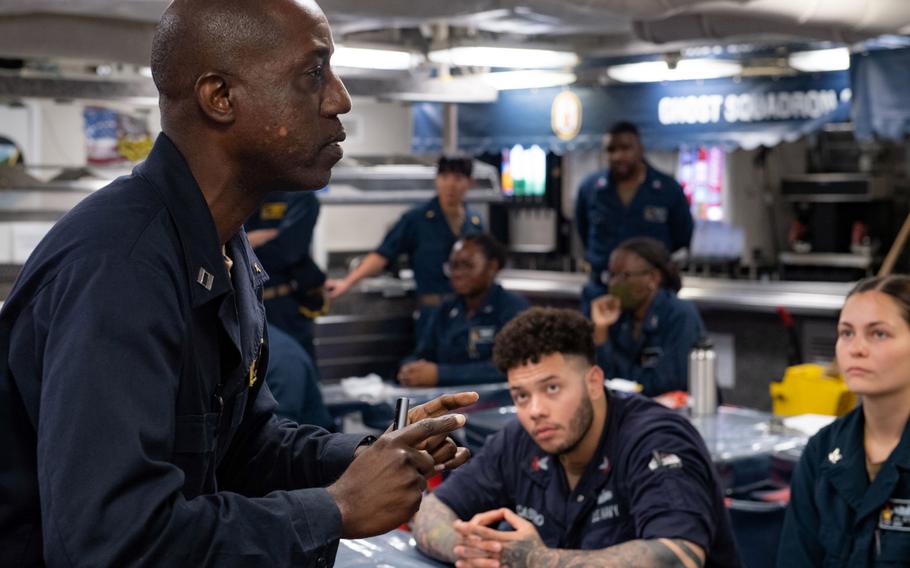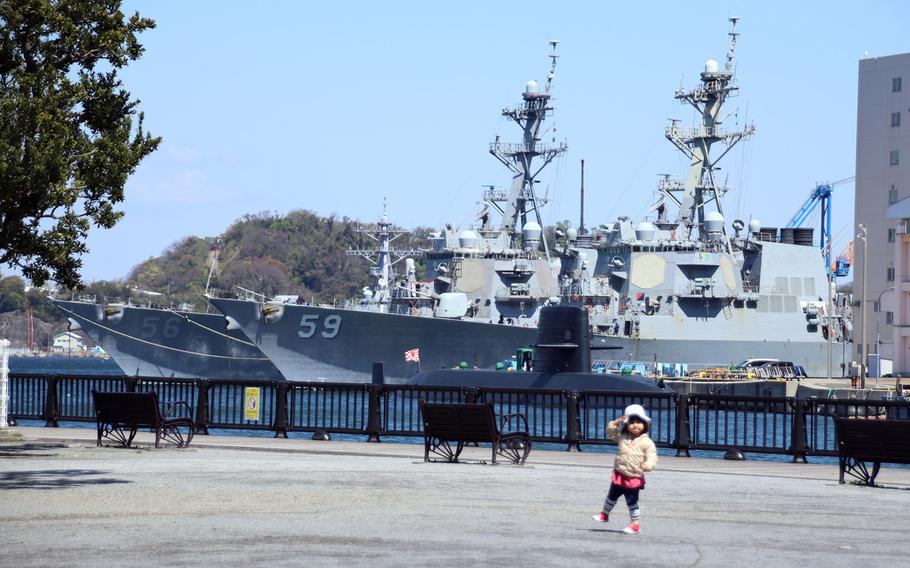
Chaplain (Lt.) Daniel Lubega, 47, speaks about resiliency to sailors aboard the the guided-missile destroyer USS Milius while underway in the Philippine Sea, Sept. 27, 2022. (Richard Cho/U.S. Navy)
YOKOSUKA NAVAL BASE, Japan — The Navy plans to permanently assign chaplains to all destroyers by fiscal year 2025 in hopes they can fill a shortage of emotional, mental and spiritual counselors aboard those ships.
While the U.S. Navy Chaplain Corps already has permanent positions aboard larger vessels such as aircraft carriers and amphibious assault ships and guided-missile cruisers, the service is planning to add 48 positions over the next two years to guided-missile destroyers, Naval Surface Forces spokesman Cmdr. Arlo Abrahamson told Stars and Stripes by email Feb. 16.
Chaplains historically supported destroyers at the squadron level, with two assigned to each destroyer squadron, Abrahamson said. Bases with large numbers of ships, such as Naval Station Norfolk in Virginia or Naval Station Mayport in Florida, have more chaplains.
Many of those, however, are being reassigned as permanent members of destroyer crews, part of an initiative from Naval Surface Forces Pacific and Naval Surface Forces Atlantic.
The Navy has 29 destroyers with assigned chaplains, Abrahamson said, with plans to add 22 more next year and another 26 by fiscal year 2025.
Chaplains serve not only as religious advisers, but also routinely assist sailors with operational stress, family problems and coping with life at sea, according to Chaplain (Capt.) Richard Ryan, force chaplain for Naval Surface Forces Pacific.
“Because of their confidentiality and their easy access, chaplains can talk with sailors about any of their concerns and will make referrals for those that require unique or specialized care,” he told Stars and Stripes by email Feb. 16.
The difference between having a squadron-level chaplain and a chaplain on the ship’s crew is significant, Ryan said. Destroyers with a chaplain onboard average 31 counseling sessions per month, compared to just three per month for those without chaplains, demonstrating that chaplains are “a resource that sailors want to utilize.”
Having access to mental health resources remains an important topic to sailors, given a spate of at least 10 suicides and two suicide attempts since April aboard aircraft carriers such as the USS Ronald Reagan, USS Theodore Roosevelt and USS George Washington.
During a Feb. 10 all-hands call at Yokosuka with Master Chief Petty Officer of the Navy James Honea, one sailor asked Honea if the Navy planned to add “deployed resiliency counselors” typically found aboard aircraft carriers and amphibious assault ships to smaller vessels such as cruisers and destroyers.
Honea responded that while larger decks are more capable of accommodating those counselors, the initiative to add chaplains to destroyers is a potential fix and that chaplains are a “great resource to start down that path of any kind of services that you might need,” such as counseling.

A child plays in a park across from the guided-missile destroyers USS. John S. McCain, left, and USS Russell at Yokosuka Naval Base, Japan, April 14, 2020. (Akifumi Ishikawa/Stars and Stripes)
Chaplain (Lt.) Daniel Lubega, 47, of Huntsville, Ala., has served aboard the Yokosuka-based destroyer USS Milius since January 2022. He said chaplains are critical to the resiliency of crews, especially when deployed.
“This is an extraordinarily stressful environment; it’s nonstop when we go underway,” he said by phone Monday. “So being able to adapt to that, adjust to that, cope with that, it’s something that chaplains are uniquely suited to assist sailors with.”
Chaplains are trained to support “any religion, or the absence of religion, that a person holds to,” Lubega said, but they aren’t practicing clinical therapists or psychologists.
“What we practice is, I would say, more along the lines of coaching, but on a small ship like ours, individuals have limited access to trained mental health professionals — so in a certain sense, we do fill that void, and we also connect sailors to” medical or mental health care providers, he said.
Chaplains are, however, trained in areas such as suicide prevention, coping strategies and basic cognitive behavioral therapy skills, Ryan wrote in his email, allowing sailors to have a “common language and build teamwork with their embedded mental health peers.”